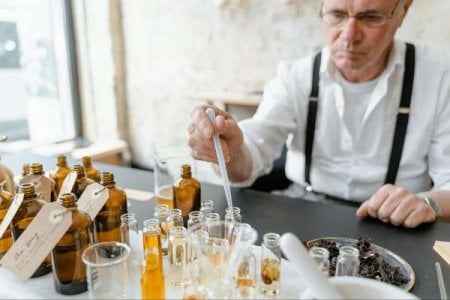This everyday beauty product could cause cancer, doctor warns—here's what you need to know immediately!
By
Maan
- Replies 0
When it comes to personal care, many of us trust that the products we use daily are safe. But recent findings have raised concerns about certain ingredients and their potential impact on health.
Here’s what you need to know about this pressing issue.
Dr Trisha Pasricha, a Harvard Medical School professor, has issued a compelling call to cut out cologne and perfume, highlighting the strong evidence linking these products to cancer and infertility.
While a spritz may seem like a harmless indulgence, even the tiniest amounts could contain 'forever chemicals'—substances that don’t break down in the body and pose significant risks.
The most concerning chemical in fragrances is phthalates, which are added to extend the scent.
According to Dr Pasricha, phthalates mimic the body’s natural hormones and disrupt the production and response to hormones like estrogen and testosterone.
The Endocrine Society has pointed to studies as 'irrefutable evidence' that these endocrine-disrupting chemicals contribute to obesity, diabetes, infertility, and various types of cancer.
Despite these alarming findings, the Food and Drug Administration (FDA) maintains there isn’t enough data to conclude that phthalates in cosmetics pose a safety risk. The disclosure of ingredients in perfumes is not mandatory, leaving consumers in the dark.
While the UK and Europe have banned or heavily regulated some phthalates, many remain authorised.
Dr Pasricha advises steering clear of fragrances altogether, especially if you’re trying to conceive or have young children.
She shared her perspective: 'I recommend avoiding added fragrances altogether—in perfumes, scented lotions and shampoos, even scented detergents and antiperspirants.'
Dr Pasricha pointed out that phthalates are prevalent in beauty products, explaining why women often have higher phthalate levels in their bodies than men. These are synthetic chemicals used to make plastics more flexible.
Furthermore, the effects of these chemicals on fertility are especially troubling. Research published in Toxicological Sciences revealed that female mice exposed in utero to the same phthalate mixtures found in pregnant women experienced fertility problems, which they then passed on to their female offspring.
Other studies indicate that higher phthalate levels in women could lower their chances of pregnancy and increase the risk of pregnancy loss before 20 weeks.
Phthalates are also linked to early puberty in girls, which raises concerns due to its association with conditions like obesity, heart disease, breast cancer, and mental health issues.
Although musk ambrette, a type of fragrance used in some products, was removed from the FDA’s 'generally recognised as safe' list and is restricted in Canada and the EU, it can still be found in certain fragrances available online.
In the US, the FDA permits nine phthalates in food contact materials, such as plastic containers, even though they are not to be added directly to food. Some states, like California, have enacted laws that include phthalates on their list of substances known to cause cancer, birth defects, and reproductive harm.
Dr Pasricha suggests that people limit their exposure by choosing 'fragrance-free' or 'phthalate-free' shampoos, reducing their intake of canned and ultra-processed foods, and avoiding heating plastic containers.
A 2018 George Washington University study found that people who consumed more fast food had phthalate levels 35 per cent higher than those who ate more grocery store food.
'As a doctor, I know we sometimes need to pick our healthcare battles wisely. But what we’re discovering about how exposure to EDCs impacts an individual’s sperm or egg cells is deeply concerning,' Dr Pasricha said.

As we learn more about the potential risks of everyday products, it’s important to stay informed and make choices that prioritise our health. What’s your take on this? Are you reconsidering the products you use daily? Share your thoughts in the comments below!
Here’s what you need to know about this pressing issue.
Dr Trisha Pasricha, a Harvard Medical School professor, has issued a compelling call to cut out cologne and perfume, highlighting the strong evidence linking these products to cancer and infertility.
While a spritz may seem like a harmless indulgence, even the tiniest amounts could contain 'forever chemicals'—substances that don’t break down in the body and pose significant risks.
The most concerning chemical in fragrances is phthalates, which are added to extend the scent.
According to Dr Pasricha, phthalates mimic the body’s natural hormones and disrupt the production and response to hormones like estrogen and testosterone.
The Endocrine Society has pointed to studies as 'irrefutable evidence' that these endocrine-disrupting chemicals contribute to obesity, diabetes, infertility, and various types of cancer.
Despite these alarming findings, the Food and Drug Administration (FDA) maintains there isn’t enough data to conclude that phthalates in cosmetics pose a safety risk. The disclosure of ingredients in perfumes is not mandatory, leaving consumers in the dark.
While the UK and Europe have banned or heavily regulated some phthalates, many remain authorised.
Dr Pasricha advises steering clear of fragrances altogether, especially if you’re trying to conceive or have young children.
She shared her perspective: 'I recommend avoiding added fragrances altogether—in perfumes, scented lotions and shampoos, even scented detergents and antiperspirants.'
Dr Pasricha pointed out that phthalates are prevalent in beauty products, explaining why women often have higher phthalate levels in their bodies than men. These are synthetic chemicals used to make plastics more flexible.
Furthermore, the effects of these chemicals on fertility are especially troubling. Research published in Toxicological Sciences revealed that female mice exposed in utero to the same phthalate mixtures found in pregnant women experienced fertility problems, which they then passed on to their female offspring.
Other studies indicate that higher phthalate levels in women could lower their chances of pregnancy and increase the risk of pregnancy loss before 20 weeks.
Phthalates are also linked to early puberty in girls, which raises concerns due to its association with conditions like obesity, heart disease, breast cancer, and mental health issues.
Although musk ambrette, a type of fragrance used in some products, was removed from the FDA’s 'generally recognised as safe' list and is restricted in Canada and the EU, it can still be found in certain fragrances available online.
In the US, the FDA permits nine phthalates in food contact materials, such as plastic containers, even though they are not to be added directly to food. Some states, like California, have enacted laws that include phthalates on their list of substances known to cause cancer, birth defects, and reproductive harm.
Dr Pasricha suggests that people limit their exposure by choosing 'fragrance-free' or 'phthalate-free' shampoos, reducing their intake of canned and ultra-processed foods, and avoiding heating plastic containers.
A 2018 George Washington University study found that people who consumed more fast food had phthalate levels 35 per cent higher than those who ate more grocery store food.
'As a doctor, I know we sometimes need to pick our healthcare battles wisely. But what we’re discovering about how exposure to EDCs impacts an individual’s sperm or egg cells is deeply concerning,' Dr Pasricha said.
Key Takeaways
- Dr Trisha Pasricha, a professor of medicine at Harvard, has urged people to stop using cologne and perfume due to 'irrefutable evidence' that they can cause cancer and infertility.
- She warns against products containing phthalates, which are chemicals that can disrupt the endocrine system, affecting the body's hormones and potentially leading to various health issues.
- Despite phthalates' association with health risks, the FDA says there's not enough evidence that phthalates in cosmetics pose a safety risk; however, some forms of phthalates are banned or tightly regulated in the UK and Europe.
- Dr Pasricha advises avoiding added fragrances in personal care products, especially for young children or those trying to conceive, and suggests choosing 'fragrance-free' or 'phthalate-free' items to reduce exposure.
As we learn more about the potential risks of everyday products, it’s important to stay informed and make choices that prioritise our health. What’s your take on this? Are you reconsidering the products you use daily? Share your thoughts in the comments below!








